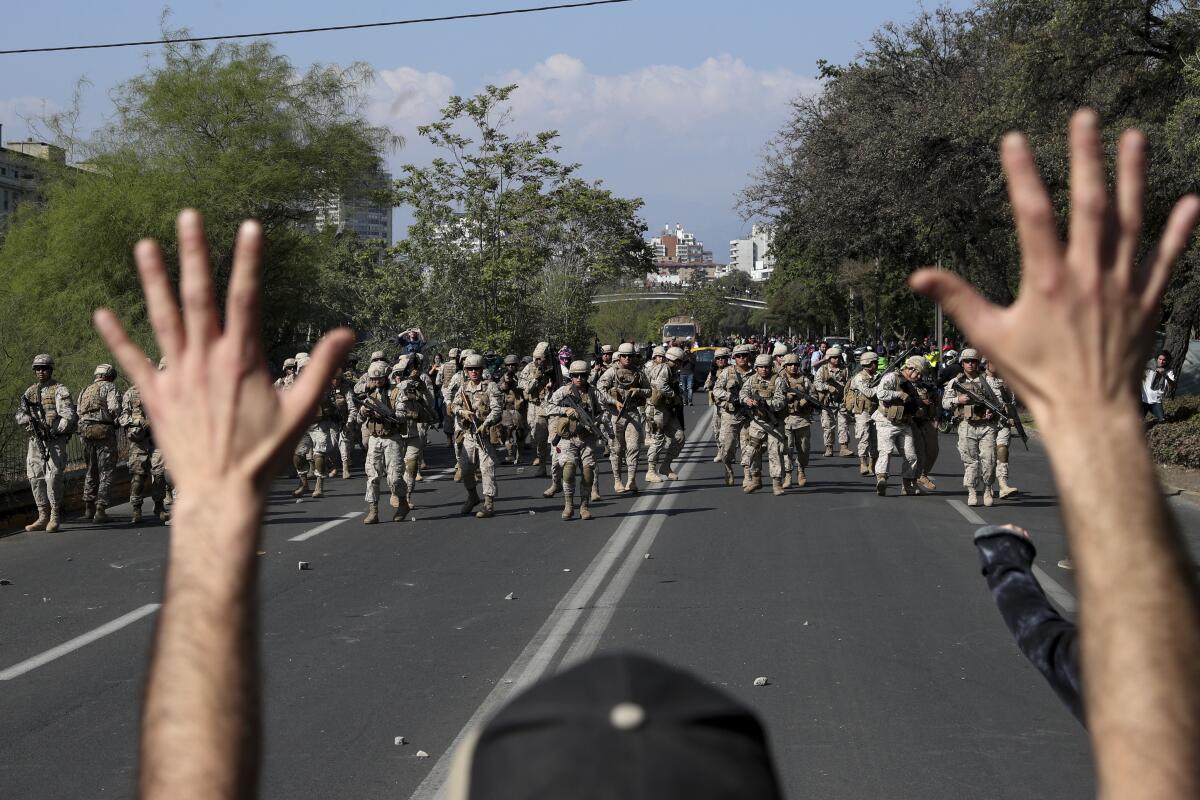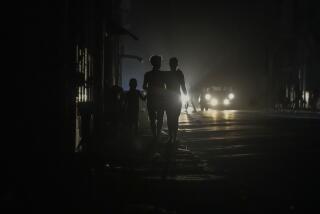‘My parents are from a frightened generation, but there is another generation that is not afraid’

SANTIAGO, Chile — “The people, united, will never be defeated,” chanted a lone masked woman in the middle of Plaza Baquedano, a central gathering spot in Chile’s capital.
As she repeated the phrase, thousands of people, mostly young, ran in all directions, fleeing water cannons and tear gas, as Chilean police sought to disperse some 20,000 protesters. The clock had just struck 8 p.m. Tuesday, marking the beginning of the fourth evening of curfew in Santiago, home to more than 7 million.
“I’m here today because social injustices are very harsh in Chile today,” said the masked woman, Marcela Balbontin, covering her face with a handkerchief with a blue and red flower print. “We have a deaf government that doesn’t understand anything.”
The protests that have paralyzed this South American nation began last week as a social media campaign by middle and high school students who called on commuters to jump subway turnstiles in rejection of transit fare hikes announced Oct. 6.
Since then, the protests and curfews have spread to most of the country, resulting in at least 18 deaths and an unprecedented state of emergency, the first declared under a democratic government in the South American nation. At least four deaths were attributed to the police or military; others were killed during looting, fires or other incidents.
According to the government, 220,000 people marched throughout the country on Tuesday in 54 separate demonstrations aimed at the administration of President Sebastian Piñera, who eventually rescinded the fare hike. By then, the protests had expanded to include demands to reduce widespread social inequality.
The state of emergency granted the armed forces control of security and the power to restrict free assembly. For many Chileans, the images of soldiers in the streets brought back dark memories of the military junta of Gen. Augusto Pinochet, who ruled the nation between 1973 and 1990.
“My parents are from a frightened generation, but there is another generation that is not afraid and is here now,” said Belen Leiva, 25, an actress. “That’s what has made Chile stand up and say, ‘Enough.’”
Along Alameda Avenue, Santiago’s main boulevard, songs by Victor Jara — who was tortured and slain in the early days of the Pinochet junta and is sometimes called the Chilean Bob Dylan — and the popular group Los Prisioneros (the Prisoners) can be heard blaring from apartments. There are almost no cars in the streets to drown out the sounds. The few vehicles that advance along the avenue must avoid barricades set on fire.
Military checkpoints dot the city, and residents must show a safe passage pass to proceed after curfew. Soldiers are seen in all subway stations, which were attacked by protesters after the fare hike proposal was announced.
One mile west of Plaza Baquedano is the Hotel Plaza San Francisco, where Nelson Concha, 63, works the night shift as a private guard. He said that many of the guests have left, alarmed by events in a nation often portrayed as an oasis in violence-ridden Latin America, albeit one with deep divisions between rich and poor.
“I lived the coup and I don’t want to live my last years like that. So I hope this calms down,” said Concha, referring to the 1973 coup that ousted democratically elected President Salvador Allende and brought Pinochet to power. “But the demands are legitimate. I will retire in two years and, like many, I will receive just over $200 a month. That forces older people to continue working and it’s just wrong.”
Meanwhile, Piñera, a conservative who over the weekend spoke of “being at war,” changed his tone.
“It is true that problems accumulated for many decades and that different governments were not able to recognize this situation of inequity and abuse in all its magnitude,” he said. “I recognize and apologize for this lack of vision.”
He then announced a package of measures that included increasing the minimum wage, bolstering retirement payments, freezing the electricity rate increases and reducing the salaries of senior public officials. In Chile, a member of Congress earns almost $13,000 per month, before taxes.
The announcement did not have the expected result. Massive demonstrations continued throughout the country on Tuesday night and again on Wednesday.
Poblete is a special correspondent
More to Read
Sign up for Essential California
The most important California stories and recommendations in your inbox every morning.
You may occasionally receive promotional content from the Los Angeles Times.









